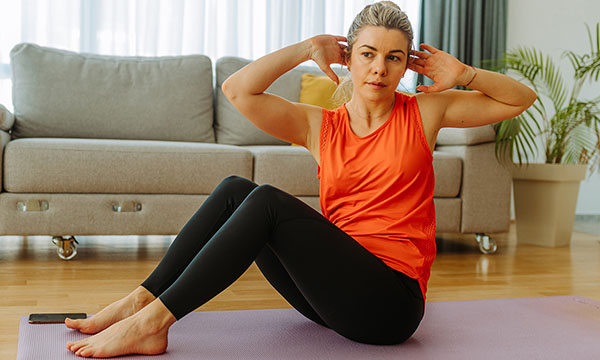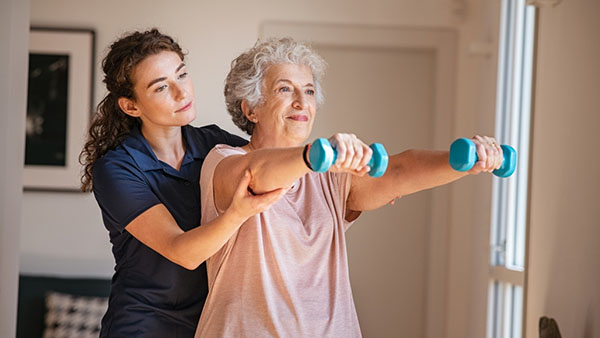As we get older, it gets challenging to read, walk, exercise, etc. We also notice several other external signs of ageing, like deepening wrinkles, pronounced laugh lines, and grey hair. That said, taking care of our health and avoiding illness is vital regardless of how old or young we are. When we age, we also develop specific health problems that are less obvious. Chronic conditions like diabetes can aggravate autoimmune diseases, making life more complicated. With a weak immune system, even a minor ailment like flu or cold can cause more issues in people aged 65 and above. To avoid further complications, it's advised to develop healthy habits that strengthen your immune system and reduce the likelihood of an illness.
Below we have compiled a list of ways seniors can stay physically and emotionally healthy.
Regular physical activity has been proven beneficial in preventing high blood pressure, cardiovascular malfunction, high cholesterol, and obesity. This can be especially true for seniors.
Exercise and physical activity for older adults helps:
● Strengthen bones and muscles for better coordination and balance
● Extend latency periods for carcinogen-related cancers like asbestos-induced peritoneal mesothelioma and other terminal illnesses.
● Boost mood and reduce stress, anxiety, and depression
● Maintain cognitive function
● Continue being independent
Even if you've led a sedentary lifestyle most of your life, it's never too late to add 20 to 30 minutes of moderate-intensity exercise to your daily routine. Low-impact, joint-friendly aerobics like walking, cycling, swimming, and rowing will work fine. You don't need to spend hours in the gym daily to see the above benefits.

Eating a well-balanced diet is essential to stay healthy, particularly for older adults. Good nutrition will help you maintain a healthy weight, stay energized, and manage chronic health conditions like diabetes, high cholesterol, or high blood pressure.
Experts recommend seniors eat foods rich in fibre, vitamins, and minerals. Nutrient-rich foods generally consist of the following.
● Whole grains
● Low-fat dairy
● Lean protein
● Vegetables and fruits
● Beans and lentils
● Nuts and seeds
Things to limit are foods high in saturated fat, salt, and added sugars but low in nutrients. This includes processed meat, deep-fried foods, desserts, and sweetened beverages. If you often rely on convenience foods, choose the healthiest options available. That said, here are a few nutritious yet, easy to prepare items you can try:
1. Instant oatmeal
2. Steam bag vegetables
3. Frozen or low-sodium canned vegetables
4. Low-sugar canned fruit or frozen fruit without added sugars
5. Rotisserie chicken or precooked grilled turkey
6. Low-sodium canned stews or soups
7. Salads
Over time, older adults may also become sensitive to foods like onions, peppers, dairy, and spicy foods. You might need to eliminate them from your diet.
As you grow older, it would be best to quit alcohol to avoid mixing it up with medications. These medicines — prescribed, over-the-counter, or herbal remedies —can be rendered ineffective or intensify side effects if and when taken with alcohol.
In addition, alcohol consumption can worsen the following health problems:
● Diabetes
● High blood pressure
● Heart failure
● Liver damage
● Osteoporosis
● Memory loss
● Depression and antisocial behaviour
Heavy drinking can also impair a person's vision, motor skills, judgment, and reaction time, thus, increasing the risk of suicides, falls, drownings, homicides, car crashes, and other accidents. Besides alcohol, smoking too many cigarettes at one time, on a given day, or over a week can also lead to harmful health consequences like cancer, heart attack, stroke, cataracts, and type 2 diabetes. Smoking can cause the muscles to tire quickly, wounds to take longer to heal, and an increased likelihood of erectile dysfunction in men. Regardless of how long you've been smoking or drinking, you'll probably live longer, have more energy, and save more money if you quit now.
But that's not all; when you quit smoking or drinking, you
● Lower your risk of lung disease, cancer, heart attack, and stroke.
● Get rid of bad breath and unpleasant body odour.
● Have a healthier, happier disposition.
● Set a good example for your children and grandchildren.

It's true that the older you get, you become quieter and self-contained, needing fewer people around you. However, your health and well-being may suffer significantly due to prolonged social isolation. You can avoid this possibility by staying active socially. If you don't have an active social life, look for opportunities to meet new people or catch up with old friends over coffee or dinner. Get involved within your community. Find people who share your interests in gyms, alums, church groups, volunteer organizations, and other groups. Watch out for any volunteering work or join a local club.
Regular checks with your primary care physician, dentist, eye doctor, and other specialized healthcare providers allow you to identify issues early and get them treated before they worsen. The American Association of Retired Persons recommends making an appointment with a geriatrician if you take several drugs, have memory or mobility problems, have been recently hospitalized, or have one or more chronic medical disorders.
Placement: Geriatricians have made it their profession to care for and treat the elderly. After the initial appointment, they can recommend other professionals, coordinate your care and treatments for health conditions, and assist you in developing a healthcare plan specific to your requirements. Vaccinations are also a vital part of preventative care for the elderly. As you age, your immune system weakens, making you prone to viral infections like influenza, pneumonia, and shingles. For most senior adults, depending on your age, your geriatrician, or primary care provider, will recommend a yearly or quarterly screening schedule that includes:
● Regular physical exams
● Body mass index (BMI)
● Skin checks
● Cholesterol and blood pressure levels
● Eye exams
● Immunizations
● Risk of cancer, STDs, and other life-threatening diseases
Understanding the risks of STDs is particularly important for seniors, as they may not realize they're as susceptible as any other age group. Geriatric healthcare plans often include education on sexual health and routine screenings for STDs to ensure overall wellness. In addition to in-person consultations, there's a wealth of information available online about STDs, their impact on health, and how to get tested. For seniors seeking discreet and thorough information on this subject, perusing reliable STD test reviews can provide insights into the variety of testing options available, helping them make informed decisions about their sexual health.
Research conducted by the Alzheimer's Society, UK, has established that there might be a causation relationship between stress and dementia. Prolonged stress is known to hurt the immune system and has also been linked to lack of sleep, depression, and anxiety.
When it comes to the elderly, maintaining an active lifestyle and a well-balanced diet is essential, as is protecting one's mental health and coping with stress. Common stress-relieving activities include yoga, meditation, and deep breathing.
As you grow older, the needs of your mind and body naturally change. However, there's never a wrong time to start taking proactive measures to maintain health and fitness, even in your 60s or 70s. With minor adjustments to your lifestyle and forging new, healthy habits, you can protect your body and keep it as fit and healthy as possible at your age.
Be the first to post comment!